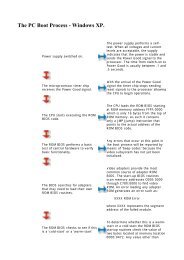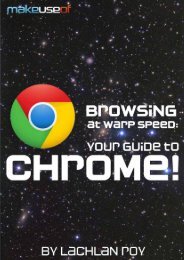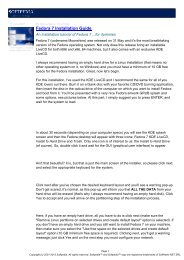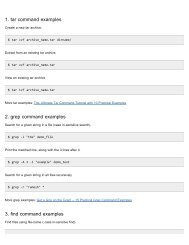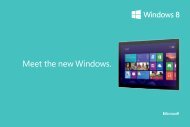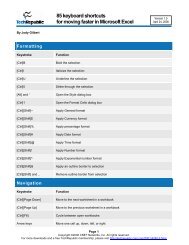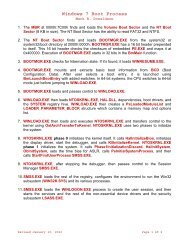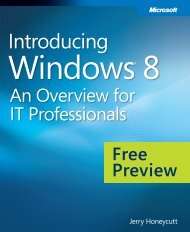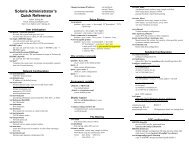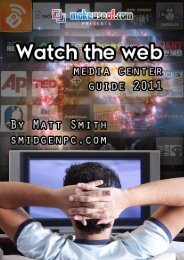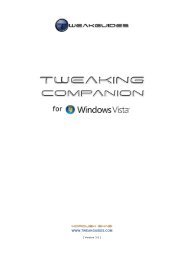Tweaking Optimizing Windows.pdf - GEGeek
Tweaking Optimizing Windows.pdf - GEGeek
Tweaking Optimizing Windows.pdf - GEGeek
Create successful ePaper yourself
Turn your PDF publications into a flip-book with our unique Google optimized e-Paper software.
Right-click in the right hand pane -> create a New DWORD Value called "CacheWriteDelay".<br />
Click OK -> double-click on it -> check the Decimal box -> type 2000 (2 seconds delay measured in milliseconds)<br />
75. Speed up your startmenu<br />
The default speed of the start menu is pretty slow, but you can fix that by editing a Registry Key.<br />
This works for all windows versions up to XP.<br />
HKEY_CURRENT_USER \ Control Panel \ Desktop \ MenuShowDelay<br />
By default, the value is 400. Change this to a smaller value, such as 0, to speed it up.<br />
76. Speed up and browse faster<br />
Normally <strong>Windows</strong> scans for shared files for Scheduled Tasks. And its turns out that you can experience a delay as long as 30<br />
seconds when you try to view shared files across a network from as <strong>Windows</strong> is using the extra time to search the remote<br />
computer. Note that though the fix is originally intended for only those affected, <strong>Windows</strong> users will experience that actual browsing<br />
speed of both the Internet & <strong>Windows</strong> Explorers improving significantly after applying it since it doesnt search for the Scheduled<br />
Tasks anymore.<br />
Open up the Registry and go to :<br />
HKEY_LOCAL_MACHINE/Software/Microsoft/<strong>Windows</strong>/Current Version/Explorer/RemoteComputer/NameSpace<br />
Under that branch, select the key :<br />
{D6277990-4C6A-11CF-8D87-00AA0060F5BF} - and delete it.<br />
This fix is so effective that it doesn't require a reboot and you can almost immediately determine yourself how much it speeds up<br />
your browsing processes.<br />
77. Remove ads from MS Messenger<br />
Go into the links.txt in MS Messenger folder and delete everything in it, and then change it read only. Don't delete the file, only<br />
what's in it. This only works on older versions of Messenger - Messenger Plus is a program that is good at blocking adverts for new<br />
versions of MSN.<br />
78. Raid - create an optimiszed stripe set<br />
A stripe set is a group of hard drives that is accessed threw the operating system as one drive. For example, if you have three hard<br />
disks and created a stripe set with parity(RAID 5) the drive would have the combined space of all three drives and the files would be<br />
striped across all three. When you format a stripe set with parity (RAID 5) you lose the size equal to one of the drives in the set. For<br />
example, if you have three 9GB drives in a RAID 5 configuration the total size of the stripe will be 18GB.<br />
79. Switch off devices you don't use and free up resources<br />
You can disable some hardware you don’t use in <strong>Windows</strong>. You can think of Joystick ports, MPU-401 (compatible)-port, CD-ROM<br />
Controllers on you soundcard if you don’t use them, etc. If you havent got any USB devices then disable it - you get the idea. Goto<br />
control panesl\system\ - doubeclick the device you want to disable, select disable this device in the hardwar profile, click ok, repeat<br />
this with other devices and restart windows.<br />
The devices you have chosen, are not enabled in <strong>Windows</strong>, so you can’t use them. Because they’re disabled, the needed drivers<br />
aren’t loaded now. This results in having more RAM and more system recourses free for other use.<br />
80. IE Full Screen Bar<br />
This tip applies to ALL Microsoft Internet Explorer releases beginning with V4. I have been using MS IE 4.01 in full screen mode for<br />
some time, but I have never been able to adjust IE's menu bar to include all basic items, like:<br />
File, Home, Back, Forward, Reload, Full screen, Help etc, and the same time display the URL address bar and get rid of IE's<br />
annoying title bar.<br />
Export the registry key that will be modified further below just in case.<br />
HKEY_CURRENT_USER\Software\Microsoft\Internet Explorer\Toolbar<br />
Next copy and paste below into notepad and save as IE4bar.reg file and double click it<br />
-----Begin cut & paste here-----<br />
REGEDIT4<br />
[HKEY_CURRENT_USER\Software\Microsoft\Internet Explorer\Toolbar]<br />
"Theater"=hex:0c,00,00,00,4c,00,00,00,74,00,00,00,18,00,00,00,1b,00,00,00,5c,\<br />
00,00,00,01,00,00,00,e0,00,00,00,a0,0f,00,00,05,00,00,00,22,00,00,00,26,00,\<br />
00,00,02,00,00,00,21,00,00,00,a0,0f,00,00,04,00,00,00,01,00,00,00,a0,0f,00,\<br />
00,03,00,00,00,08,00,00,00,00,00,00,00<br />
------End cut & paste here------<br />
81. CD/DVD Max Speed<br />
When you right-click on My Computer and select Properties, the System Properties applet opens. Click the Performance tab, click<br />
File System and choose the CD-ROM tab. Look at the "Supplemental cache size". When you move this slider all the way up to the<br />
right, <strong>Windows</strong> 95/98/ME allocates a maximum of 1238 KB from your computer's memory. You can increase these settings even<br />
further. The table below shows all the "CacheSize" and "Prefetch" values you need to modify for cd-roms/dvds of different speeds,<br />
starting with 4x (maximum allowed by <strong>Windows</strong>) and up to 52x<br />
The maximum values <strong>Windows</strong> allows are.<br />
Hex values:<br />
HKEY_LOCAL_MACHINE\System\CurrentControlSet\control\FileSystem\CDFS<br />
"CacheSize"=hex:6b,02,00,00<br />
"Prefetch"=hex:e4,00,00,00



